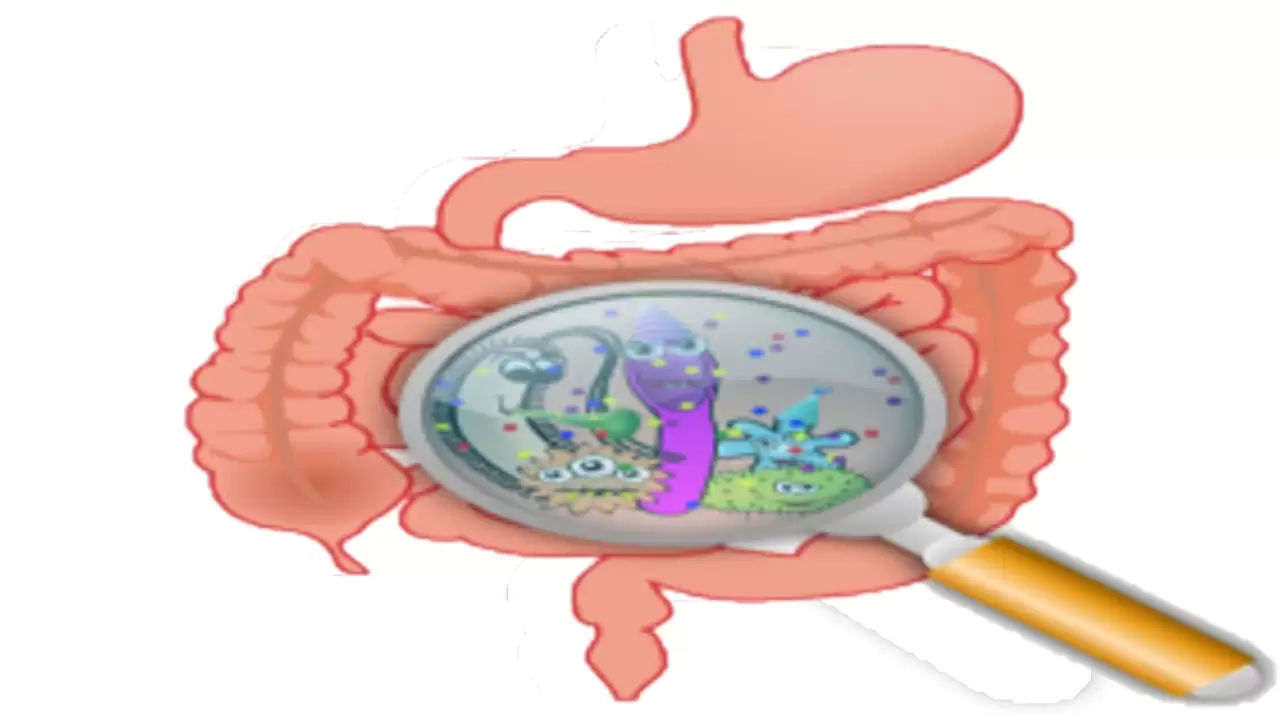
" He who learns but does not think is lost! He who thinks but does not learn is in great danger."
Confucius (551 BC – 479 BC) was a Chinese teacher, politician, and philosopher. By Simran Khurana (Updated March 18, 2017)
The combination of poor processed and industrialized nutrition with stress, anxiety, and lack of leisure is the number one cause of chronic morbidity.
The holistic view of the human body often contradicts the standard symptomatic treatment in conventional medicine.

The Holistic principle - A single organ or system cannot be cured apart from the rest of the body.
The entire body's immune system must also recover. It contradicts conventional medicine, which mainly treats symptoms of chronic diseases.
The immune system is even throughout our entire body, but its manifestation may differ in our body's organs/systems. The location of symptoms does not necessarily reveal the main problem. Often, the illness is along the harmed energy channel. (Meridian)
- This phenomenon's explanation stems from the nutrients' availability and ability to reach and repair accumulated tissue damage. The blockages result from compromised blood, bile, and lymphatic flow. (Causes are mainly due to an unhealthy mental and physical lifestyle.)
The immune system's strength results from the body's physiology, integrated with the mental-energetic state.
The holistic principle is much more profound than it seems.
Link: Surprisingly, modern medicine has no distinctive philosophy!
- The practical meaning of the principle is that the immune system must be strengthened gradually, combining body, mind, and spirit. Symptomatic treatments cannot cure chronic diseases.
If we examine, we will discover that conventional modern medicine is not holistic medicine!
- Modern medicine consciously treats the symptoms of chronic diseases rather than the causes since these are not fully known. Even the treatment of various types of cancer, including biological treatments, is intended to prevent less damage, but in essence, these are treatments for the symptoms of the disease. (The cancerous tumor is a symptom of the disease.)
The failure of modern medicine to cure chronic diseases is due to the wrong logic!
The digestive system is illustrated.
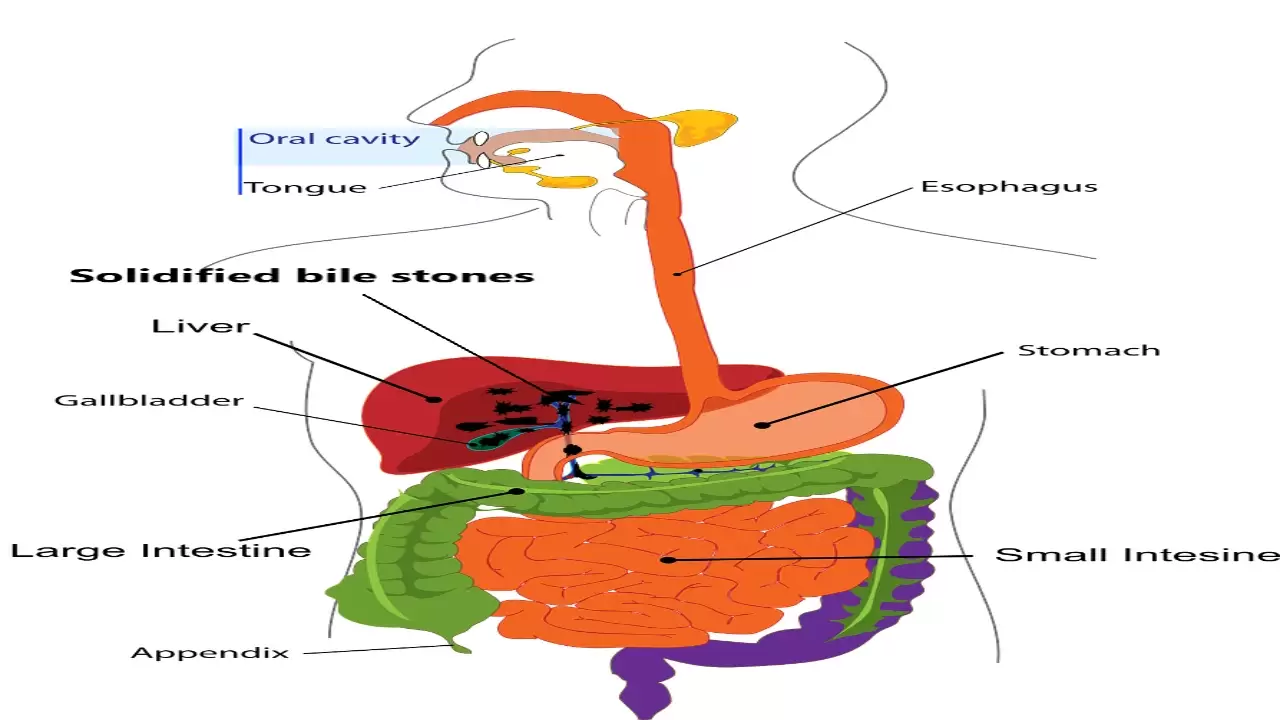
Why is the acid-base balance important, especially in the digestive tract?
- In contrast to our blood in a minimal range of values (of a weak alkaline environment) in the digestive system, there are very high acid-base gaps. The saliva is usually neutral, with a tendency to slight acidity.
- The stomach is particularly acidic (P.H. 1-2) due to the need to break down food. Bile produced in the liver and excreted into the duodenum through the gallbladder while eating greasy foods is alkaline (P.H. 9-10). Bile duct obstructions may cause high acidity in the gastrointestinal tract.
High gastrointestinal acidity is a widespread phenomenon that has far-reaching effects on the immune system. Pathogens always present in the gut tend to thrive in an acidic environment.
Balancing gut flora is critical to maintaining good health.
An imbalance in gut flora affects the immune system, which fights relentlessly to prevent the overgrowth of pathogens. Our lifestyle and diet significantly impact our immune system.
- Poor nutrition of processed and industrialized foods significantly affects the liver and kidneys. Bile fluid, a strong chemical base, tends to crystallize and clog the liver and gallbladder; thus, the problem only worsens. Bile flow is critical for maintaining proper gastrointestinal function. It is oily and lubricates the intestines; it also counteracts the high acidity of the food from the stomach, thereby preventing an acidic intestinal environment.
Common symptoms of intestinal flora imbalance:
- Gastrointestinal gases are usually the result of a territorial war between good and pathogenic bacteria.
- An impaired immune system results in higher fever, flu, and gastric ulcer morbidity.
- At pH levels of 6 and below, urine is usually more acidic. Parasites "thrive" in the acidic gut environment.
- An imbalance in gut flora impairs the brain's neurotransmitters, such as serotonin, expressed in decreased alertness and cognitive ability.
- The uncontrolled proliferation of gastrointestinal pathogens damages the intestinal wall, impairing intestinal absorption. Constipation and abdominal obesity are common phenomena not always attributed to a lack of balance in gut flora.
- The neurotransmitter serotonin is mainly produced in the intestines using good bacteria. An unbalanced intestinal flora reduces serotonin production and causes a decrease in alertness and mood.
Recommended foods for balancing the gut flora.
- Fruits, vegetables, roots, mushrooms, sprouts, legumes, berries, nuts, and lentils.
- Foods are rich in dietary fiber.
- Non-genetically modified natural oils. (Cold-pressed only.)
- All-natural fermented products. (Such as goat yogurt).
- Deepwater fish - Rich in omega 3.
- Goat milk and Yogurt.
Minimize or avoid totally.
- A sharp reduction in eating industrialized and processed foods.
- Plain sugars and high glycemic carbohydrates combined with meat and dairy products.
- Solidified vegetable oils - trans oils.
- Animal protein.
- Especially minced, smoked, and canned meat.
- Dairy products, in general, especially hard cheeses.
Link: A balanced-varied diet is the best anti-inflammatory diet.
It is essential to emphasize that balancing the intestinal flora is usually accompanied by a temporary worsening of specific symptoms. The explanation for this phenomenon is that parasites and dead pathogenic bacteria release potent toxins. At the same time, the change for the better is significant, and its effect is not only on the digestive system.
Industrialized and processed foods have devastating long-term consequences. (Without us being aware of it)
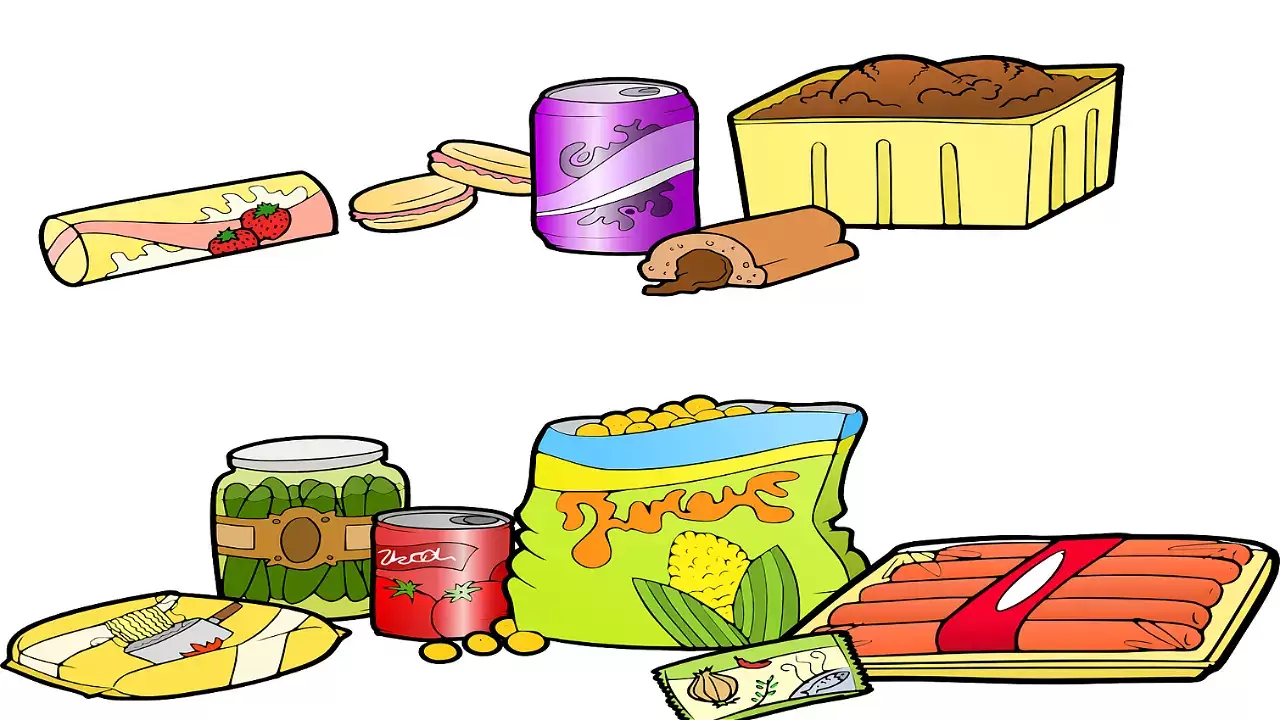
Due to processed foods and beverages, Type 2 diabetes has become an epidemic in China. 
A combination of an industrialized diet, an unhealthy, leisure-free lifestyle, and constant stress devastates the body and mind.
- Diabetes type 2 patients rose from about 20 million in 2000 to about 110 million in 2015, with a forecast of 150 million in 2040. By 1980, type 2 diabetes was an uncommon disease in China.
The leading cause of T2D is transitioning from a plant-based diet to a highly processed and industrialized animal protein diet combined with a stressful lifestyle.
- The most notable dietary change in the period under consideration is a dramatic increase in meat, dairy, pastries, and fast food consumption. Chinese cuisine is based mainly on frying; switching to cheaply refined oils has turned them into trans fats.
- China's meteoric development has put heavy pressure on its population.
A similar phenomenon (but less acute than that of China) exists in Japan and Korea.
- The cultures of the Asian peoples are very competitive and disciplined, with complex work values that leave little leisure time.
Is rice the cause of diabetes? (The answer is no.)
- The diet of Asian people is based on rice as the main carbohydrate. But rice is not to blame! Until 40 years ago, diabetes was a marginal disease in Asian nations, and rice was an ancient food.
The countries with the lowest diabetes rates are Lithuania, Estonia, Ireland, Sweden, Luxembourg, England, and Australia.
- These countries consume no fewer carbohydrates and sugars than exist in Asian nations. The British Fish and chips are no better than the Japanese diet! The main difference is the leisure cultures.
Until 100 years ago, diabetes was a rare disease; until the mid-50s of the 20th century, it was a marginal disease.
- About 50 years ago, the fast-paced and industrialized food revolution erupted in full force. This revolution, combined with a demanding and leisure-free lifestyle, has created a record-breaking chronic illness—not just diabetes!
Diabetes is a symptom (of an unhealthy diet and lifestyle). It is worth noting that diabetes has a noticeable mental-energetic dimension. Obesity is another symptom of an unhealthy diet and lifestyle. It is not the cause of diabetes!
A simple habit that will help you balance your gut flora and improve bowel movements:
- Squeeze a lemon (you can have half a lemon, depending on the size) and add to a glass filled with lukewarm water. Add a heaping tablespoon of apple cider vinegar and two tablespoons of olive oil, and drink the mixture on an empty stomach, preferably immediately in the morning. (You can drink the olive oil and apple cider vinegar separately.)
- Lemon juice is acidic but acts as a base in our body, cleansing the kidneys and neutralizing the acidity of the digestive system. Apple cider vinegar cleanses the liver, and olive oil activates the gallbladder to secrete bile fluid. The combined action helps empty the digestive and urinary tract and prevent constipation.
- This simple operation does not require a long preparation time and is suitable for the whole family, including the young and healthy.
Adopt this simple habit of healthy living; it will save you a lot of suffering.
Intrahepatic solidified bile stones block the bile flow to the duodenum. (Very common - Often asymptomatic.)
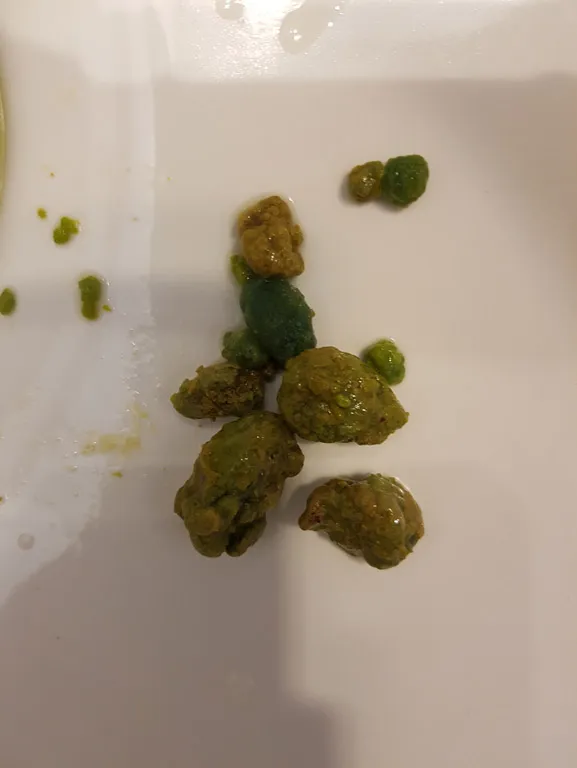
Why is restoring bile fluid flow (Liver-produced) essential to the immune system?
Mechanical cleansing of the liver and Kidney is one of the most potent tools in immune system rehabilitation.
Link: Liver and Gallbladder Flush. Instructions, Benefits, and Risks.
Most people are unaware of the importance of proper bile fluid production and flow throughout the digestive system.
Bile fluid is also used as the body's sewage system. Many toxins, especially those soluble in fat, come from the liver through all the body's intestines. The foul smell of the feces is mainly due to these toxins.
- Bile is a strong alkaline that counteracts the acidic food from the stomach. Otherwise, the entire intestines are acidic.
- In a pH-balanced environment, parasites in the digestive system do not thrive, significantly strengthening the immune system.
- Bile is a lotion that contains fats and salts that help lubricate and restore the intestinal walls.
- Restoration of the natural flora in the intestines significantly strengthens the immune system and helps recover from many chronic diseases.
Bile obstructions are very common for the following reasons:
- The modern life and nutritional habits they brought with them and the growing environmental pollution cause the liver to reduce bile production.
- The imbalance between the various components of the bile fluid causes the crystallization of the bile fluid.
Jarisch–Herxheimer reaction. (Dead pathogens release harmful toxins.)
Link: Jarisch–Herxheimer reaction (Wikipedia)
- Dead parasites inside the digestive system release toxins and gas that cause side effects and significantly overload the immune system.
- An imbalance in the gut flora is most often expressed in farting and gases in the digestive system.
Liver and Kidney's primary functions.
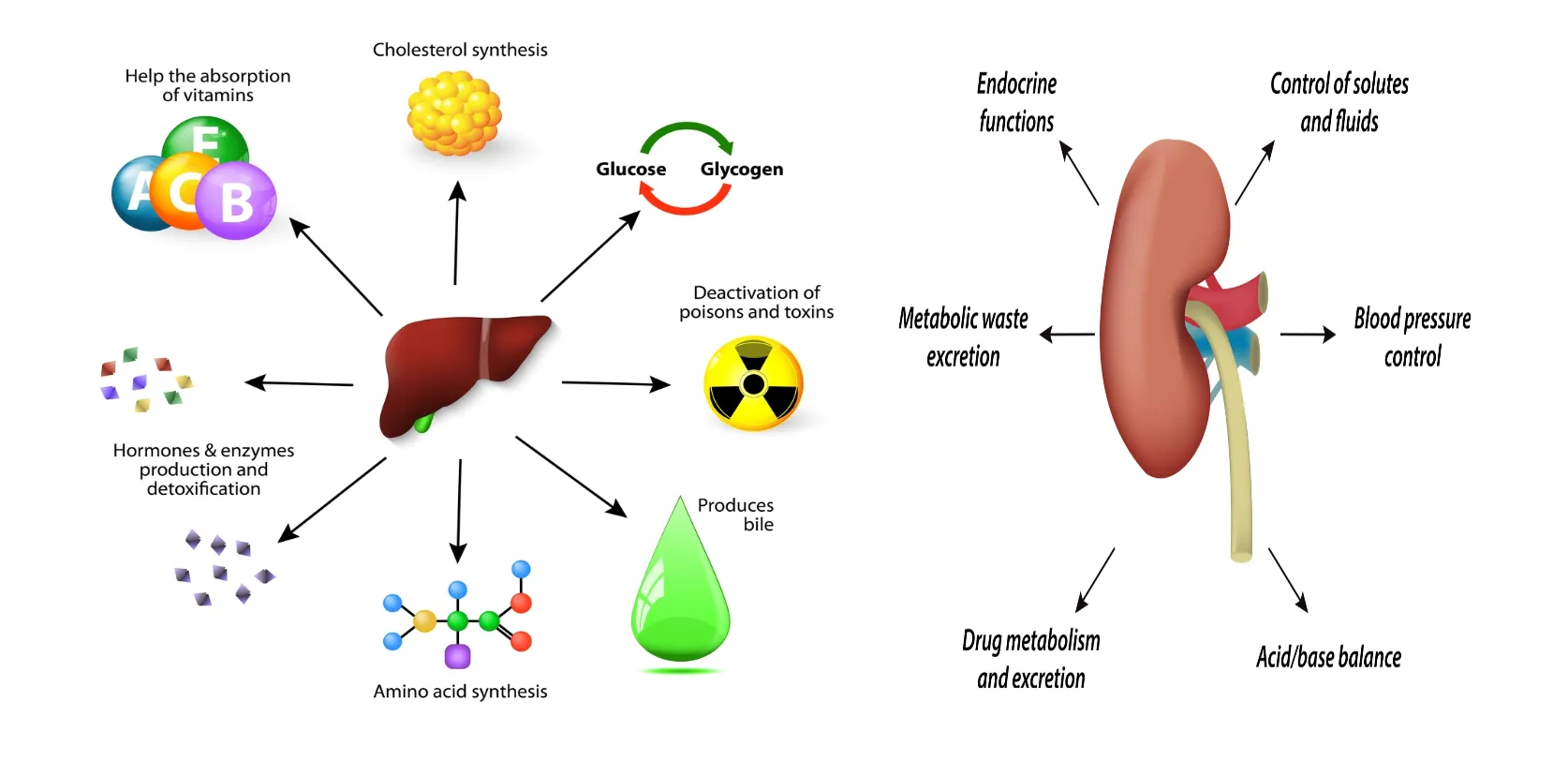
Traditional Chinese medicine indicates a close relationship between the liver and the kidneys.
- Both organs have many complementary functions. Weakness in one organ overloads the other and explains why liver patients (like me) have kidney cysts (especially in the right Kidney) and kidney patients experience weak liver function.
The liver and kidneys are not specialized immune system organs, but they have a crucial impact on metabolism and the immune system.
- In modern times, with industrialized and processed diets, constant stress, and anxiety, the liver and kidneys filter toxins heftily. Weakness causes them to become blocked and develop cysts, further reducing their function.
- Obstruction of the gallbladder is a widespread phenomenon in women especially. The explanation for the phenomenon is fluctuations in female sex hormones due to pregnancies, fertility treatments, birth control pills, menstruation, and menopause.
- Fatty liver, biliary tract obstruction, kidney stones, and cysts are common. These obstructive conditions are challenging to cure and require mechanical detoxification, which is not part of the worldview of modern medicine that completely rejects detoxification therapies.
Link: Comprehensive Mechanical Detoxification Explained.
Medicine uses dialysis and artificial liver machines but does not see them as detoxification techniques.
The immune system's dedicated organs. (It is not a complete list!)
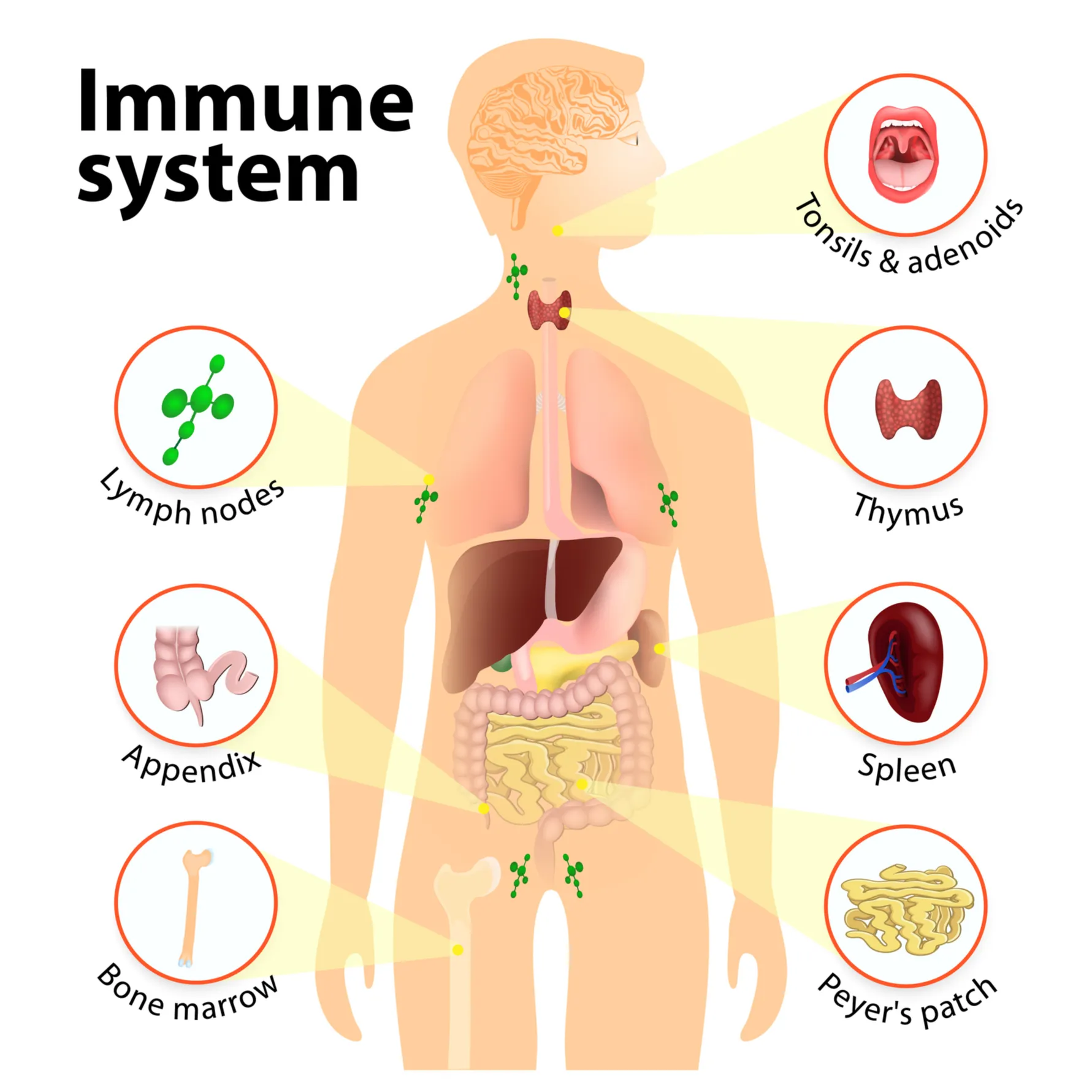
The immune system is a part of the survival self-defense mechanism.
Link: Immune system (Wikipedia)
- The biological survival self-defense mechanism is common to all organisms.
- The immune system is a part of this mechanism.
- Humans have the most sophisticated physical and mental mechanisms for survival and self-defense.
There are two components of the immune system.
- Innate immune system - More basic non-specific immediate immune response.
- Adaptive immune system—explicitly targeted against a variety of foreign invaders. While very useful, it takes time. The advantage is that information about the antibody is stored in memory in case of need.
All coronavirus vaccines should act on the Adaptive Immune system to give the patient as long-term a vaccination as possible.
Glutathione - Essential antioxidant at the cellular level. (Often ignored.)
- Glutathione is of enormous importance in the proper functioning of the immune system.
- Prolonged glutathione deficiency can cause severe illnesses, including cancer.
- Glutathione cannot be consumed in its active form; the liver must synthesize its active form. (There are glutathione injections on the market, but their effectiveness is unclear.)
- Eating sulfur-rich foods has a significant contribution to improving the level of glutathione in the body:
- Such as Avocado, cabbage, cauliflower, kale, broccoli, Himalayan salt, (black) onion, and garlic.
- The biological survival self-defense mechanism is common to all organisms.
- The immune system is a part of this mechanism.
- Humans have the most sophisticated physical and mental mechanisms for survival and self-defense.
A partial list of symptoms that the body uses for self-defense and survival.
When these symptoms are part of a chronic illness, symptomatic treatment should be as short as possible while improving the patient's lifestyle and diet.
Physical:
General signs.
- Pain and discomfort. (Pain is a warning sign.)
- Fever is a sign of inflammation. (Only in exceptional cases is it necessary to lower the heat through medication.)
- Sweat is usually a tool to regulate the body's temperature.
- Fatigue. (This is a sign that the immune system is struggling; it takes a lot of energy.)
Detoxification. (It means cleansing toxins from the body.)
- Cough and Runny nose.
- Nausea &Vomiting.
- Diarrhea.
- Phlegm.
- Frequent urination.
- Intense sweating.
Mental. (There are many.)
- Such as denial. (The first stage in the Kubler-Ross psychological model.)
- Lies are also a part of the mental self-defense mechanism.
- Suicide is an extreme case of mental self-defense with tragic consequences.
To achieve a balanced gut flora, eat varied and natural foods and beverages that are not processed or industrialized. Dietary fiber, natural oils and fats, and fermented foods (naturally) significantly contribute to gut health.
The main factors that cause an imbalance in the intestinal flora are industrialized and processed foods and beverages.

The holistic principle of the human body is seen as simplistic, but it is of enormous importance in understanding how to treat chronic diseases. Modern medicine is mechanistic and does not operate according to the holistic principle.

